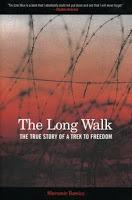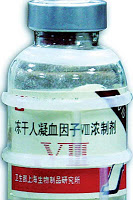A heart-breaking story comes out of China, one that too many in our own US community can relate to: trying to wrest compensation for HIV and hepatits C infection from tainted blood products. The news wires are reporting that the Heilongjiang Province family of Wang Lei filed a lawsuit over the infected factor VIII in June 2003 at Changning district court in Shanghai. It appears that big city families are already getting compensation; Shanghai-based hemophiliacs each had their medical expenses reimbursed. But families from rural areas and distant provinces are getting no help.
The Chinese courts claim that the plaintiff failed to provide sufficient evidence and an HIV virus infection might have come through any one of multiple channels, according to Wang Lei, the father of the boy. The courts are telling them to find compensation elsewhere.
We all know that trying to get anything done in a Communist regime is a nightmare of bureaucracy. “After further court failures in his home city of Harbin, capital of Heilongjiang,” the papers report, “Wang and his peers have trudged thousands of miles down the many and various hopeless petitioning bureau lines of China. One out of every 500 petitioners, or 0.2 percent, have their problem actually solved, according to Yu Jianrong, a researcher at the Chinese Academy of Social Sciences, in his 2004 report The Deficiency of Petition System and its Political Consequences.”
Eight years of struggle with the Shanghai Institute of Biological Products and its parent pharmaceutical company of Sinopharm has not paid off. By contrast, Hong Kong-listed Sinopharm – the China National Pharmaceutical Group Corporation – reportedly earned over 700 million dollars in 2008. Its revenue in 2007 reached 35 billion yuan.”
And recently, on December 30, the news really hit the wires when the family and other families with hemophilia petitioned in front of the Beijing headquarters of Sinopharm for a compensation package for the 15-year-old blood contamination scandal.
They’re asking for about $146 as living expenses and also hotel fees from a month’s petitioning in Beijing, plus six vials of factor VIII. Six vials. For all their troubles!
After three rounds of negotiations, Sinopharm agreed to offer each patient $1170 “consolation money” and paid their Beijing hotel bills. “The petitioners were reminded that the company will make no more payments and accept no more petitions,” one story reported.
Sinopharm’s corporate slogan? “Care about life. Care for health.”
The father, Wang Lei, has paid for his son’s treatments by borrowing from relatives. Compounding their problems: he and his wife were laid off in 1997. They are running out of treatment options.
China has about 130,000 people with hemophilia, and about 1,000-2,000 are HIV-positive. Two bright notes: China now has a dynamic patient-based group called Hemophilia Home of China, which can help families like Wang Lei, and Asia Catalyst, a non-governmental organization based in New York, has raised some suggestions for China’s population with hemophilia and HIV to help keep the good fight going. It’s a fight well known to some hemophilia veterans here, who have known the rejection, isolation and hopelessness, but who eventually prevailed, at least in the courts. Let’s hope China achieves that one day soon.
From “Wrong blood, wrong place, wrong time,” Global Times [22:42 January 07 2010] By Yin Hang
Great Book I Just Read
The Long Walk by Slavomir Rawicz
This incredible story of survival recounts the remarkable true tale of a 24-year-old Polish soldier who is captured by the Russians, held for 18 months in brutal, subhuman conditions while being interrogated, and eventually set on a 1,000 mile journey to prison in Siberia. The scenes of camping in a subzero degree frozen wasteland in nothing more than shirts and pants defy the imagination. He has to walk, while chained by the hand to a truck, for miles and miles until they reach the prison. He never once gives up on escape, though he is surrounded by the brutal winter of Siberia. But he does it, with six other men, and they walk literally thousands of miles, even through the Gobi desert, to reach British-held India. Incredible story of survival, told without a hint of “why me” or injustice or bitterness. Must read! Four stars.


